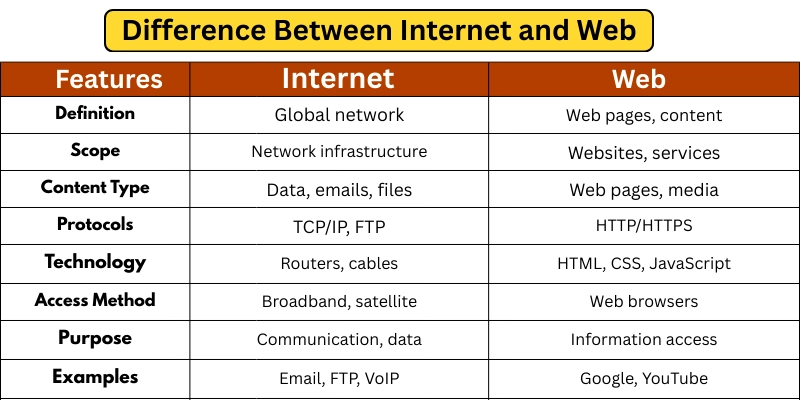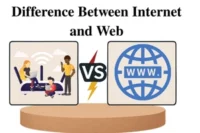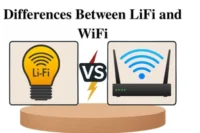Explore The Difference Between The Internet and The Web: Explained Simply
Published: 5 Sep 2025
Many people mistakenly think the Internet and the Web are the same, but they’re not. The Internet is the global network connecting devices, while the Web (WWW) is a service that runs over it.
In this article, we will try to cover and answer the confusion around the Internet versus WWW, explaining how these two components work together to power everything from websites to online services. By the end of this article, you’ll completely understand the difference between the Internet and the Web and why it matters in our digital lives.
Let’s dive in and clear up this common misconception once and for all!

10 difference between The Internet and The Web
These days, we often use the Internet and the Web to mean the same thing. So, even though they are linked, they are not the same thing. Let us make it easy to understand:
- Definition
- Scope
- Content Type
- Protocols
- Technology
- Access Method
- Purpose
- Components
- Examples
- Dependency
1. Definition
The most basic difference between the Internet and the Web is in their definitions. The Internet is the global network that connects computers and devices. At the same time, the Web is a service that allows users to access information through websites.
Internet
The Internet is a global network that connects millions of computers and devices. It helps these devices talk to each other, share information, and use different services. It’s like the routes that connect everything in the world.
Web
The Web, or World Wide Web (WWW), is a system of websites and web pages that you can visit using a browser. It is part of the Internet but specifically focuses on showing you information, videos, and images through websites.
2. Scope
The Internet and the Web also differ in their scope. The Internet is a bigger system that enables different services. In contrast, the Web is just one of those services, focused on providing web pages and applications.
Internet
The Internet is much more prominent. It supports many services like email, online gaming, VoIP (Voice over IP) for calls, and cloud computing. It’s the infrastructure that connects everything.
Web
The Web is just one part of the Internet. It lets you access and interact with websites and web applications. You can think of it as one service on the Internet that allows you to browse and explore.
3. Content Type
Another significant difference is the type of content they manage. The Internet provides a wide range of information, including emails and online games. Still, the Web focuses mainly on web pages, videos, and articles.
Internet
The Internet accepts all types of data. You can send emails, conduct phone and video chats, download files, and access social media. It can handle data in a variety of formats other than web pages.
Web
The Web is primarily concerned with websites and web pages. It shows material such as articles, videos, photos, and social media updates. You go to a website to view and engage with this stuff.
4. Protocols
The protocols used on the Internet and the Web are also different. Let’s discuss their protocols.
Internet
The Internet uses protocols (rules) like TCP/IP (Transmission Control Protocol/Internet Protocol) to send data across different networks. It also uses SMTP for email, FTP for transferring files, and VoIP for internet calls.
Web
The Web uses HTTP (HyperText Transfer Protocol) to send web pages from a server to your browser. HTTPS (the secure version) ensures that the website is safe to browse, protecting your personal information.
5. Technology
The technology behind the Internet and the Web is another point of distinction. Various types of technologies are discussed below:
Internet
The Internet needs routers, servers, cables, and fiber optics to work. These are the physical tools that make it possible for devices to connect and communicate with each other.
Web
The Web uses HTML to structure web pages, CSS to design them, and JavaScript to make them interactive. These technologies help create websites that are engaging and fun to use.
6. Access Method
We also have several ways of accessing the Internet and the Web. Learning these methods to access internet and eebsite is very important.
Internet
You may connect to the Internet using any connected device, such as your smartphone, tablet, or laptop. The Internet allows you to access a variety of online services, including email, video calls, and cloud storage.
Web
To use the Internet, you must have a web browser (such as Google Chrome, Safari, or Firefox) and an Internet connection. Your browser allows you to explore websites and interact with their content.
7. Purpose
The Internet and the Web provide various functions. Let’s discuss their functions in detail.
Internet
The Internet is used for many things. Its primary purpose is to connect devices worldwide so they can share data and communicate. It supports various services, like sending messages, file sharing, and making phone calls.
Web
The Web is designed for browsing and accessing information. It’s where you go to read news, watch videos, shop, and learn. Its primary objective is to help you find and interact with content.
8. Components
In terms of components, the Internet comprises both physical hardware and software systems. In contrast, the Web is made up of websites, web pages, and server-hosted apps.
Internet
The Internet consists of hardware (like servers and routers) and software (such as communication protocols and internet services). Together, they allow the transfer of data between devices.
Web
The Web consists of websites and web pages that are stored on web servers. These pages are connected with hyperlinks so you can navigate between them easily.
9. Examples
The services offered by the Internet and the Web also differ.
The Internet: Examples include:
- Email platforms like Gmail.
- File-sharing services like Google Drive or Dropbox.
- VoIP tools like Skype and Zoom for calls.
- Cloud services like AWS (Amazon Web Services).
The Web: Examples include:
- Social media platforms like Facebook and Twitter.
- E-commerce sites like Amazon and eBay.
- Streaming services like YouTube and Netflix.
- Blogs and news websites like BBC or CNN.
10. Dependency
The most significant dependency difference is that the Web relies entirely on the Internet to function, but the Internet operates independently of the Web and supports many other services outside of web browsing.
Internet
The Internet can function even without the Web. You can use services like email or cloud storage without ever going to a website.
Web
The Web is unable to operate without the Internet. To visit websites and view online content, you must have access to the Internet.
Conclusion
So, let’s finish this topic! In this article, we’ve explored the key differences between the Internet and the Web in simple words. The Internet is the backbone that connects everything, while the Web is where you browse websites and interact with content.
Suppose you’re just starting to learn about the Internet and the Web. In that case, it’s a great idea to begin with understanding the Internet, since it’s the basis of everything we do online.
Do not forget to check out more beginner-friendly articles on Complete Tech Guide to grow your technology knowledge!
Questions about difference between The Internet and The Web
Here are some important FAQs about the internet versus web.
The Internet is a network that lets devices all over the world connect and share information.
The Web is the part of the Internet where browsers like Chrome and Safari let you go to websites and get information.
The Internet connects devices globally, allowing access to public websites and services. The Intranet is a private network used within a specific community, providing secure access to internal resources.
The Internet links devices like computers and smartphones throughout the world, but the Internet of Things (IoT) is a network of ordinary items (such as smart thermostats and lights) that connect to the Internet to exchange data and engage.
No, the Web depends on the Internet to access websites. Without an Internet connection, you can’t browse the Web.
Yes, the Web operates on the Internet. It is one of several services that use the Internet to display web pages and information through browsers.
Browsers such as Google Chrome and Mozilla Firefox may open locally stored pages without an Internet connection. They still require the Internet to access online resources.

- Be Respectful
- Stay Relevant
- Stay Positive
- True Feedback
- Encourage Discussion
- Avoid Spamming
- No Fake News
- Don't Copy-Paste
- No Personal Attacks



- Be Respectful
- Stay Relevant
- Stay Positive
- True Feedback
- Encourage Discussion
- Avoid Spamming
- No Fake News
- Don't Copy-Paste
- No Personal Attacks





